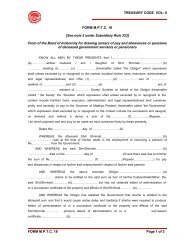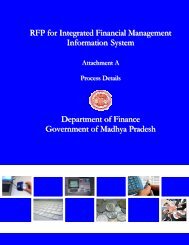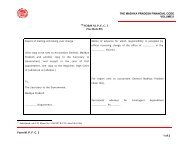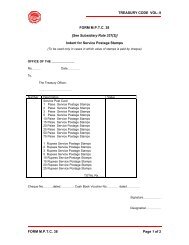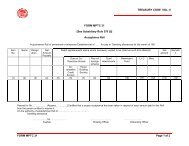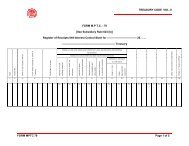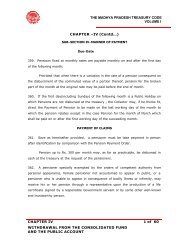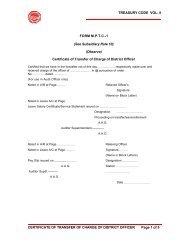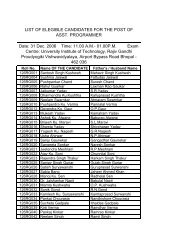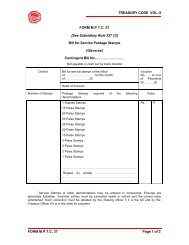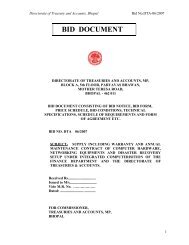the madhya pradesh treasury code volume i - Mptreasury.org
the madhya pradesh treasury code volume i - Mptreasury.org
the madhya pradesh treasury code volume i - Mptreasury.org
You also want an ePaper? Increase the reach of your titles
YUMPU automatically turns print PDFs into web optimized ePapers that Google loves.
THE MADHYA PRADESH TREASURY CODEVOLUME ICHAPTER- VIIIDEPOSITSSection I-Introductory533. Moneys received at <strong>the</strong> <strong>treasury</strong> for deposit in <strong>the</strong> Public Account are classifiedaccording to <strong>the</strong> department through which <strong>the</strong>y are received, <strong>the</strong> usual classesbeing(1) Revenue Deposits, (2) Civil Court Deposits, and (3) Criminal CourtDeposits.Ano<strong>the</strong>r important class in "Personal Deposits" of which <strong>the</strong> account kept at<strong>the</strong> <strong>treasury</strong> is of <strong>the</strong> nature of a banking deposit account, <strong>the</strong> receipts andpayments being recorded in personal ledgers. O<strong>the</strong>r classes of deposits may beadded under special orders of <strong>the</strong> Government in consultation with <strong>the</strong> Accountant-General.Note:1- Separate registers must be kept for each class of deposits in accordancewith <strong>the</strong> directions contained in this behalf in <strong>the</strong> Account Code, Volume II, orunder special instructions of <strong>the</strong> Accountant-General.Note:2- In this State all deposits of revenue and criminal courts are taken to <strong>the</strong>head "Reserve Deposits" and shown in one register for <strong>the</strong> whole district.534. Unless <strong>the</strong>re be anything repgnant in <strong>the</strong> subject or context, relevant provisionsof this chapter shall apply to deposit transactions of <strong>the</strong> Public Works and ForestDepartments whose initial accounts are kept in departmental offices, except in so faras <strong>the</strong>y may be varied or supplemented by departmental regulations.535. At places where <strong>the</strong> cash business of <strong>the</strong> <strong>treasury</strong> is conducted by <strong>the</strong> Bank,moneys tendered as deposits will be received and repayment of such deposits will bemade by <strong>the</strong> Bank in accordance with <strong>the</strong> procedure laid down in Subsidiary Rules454, 455 and 468 to 470.CHAPTER VIII 1 of 32DEPOSITS
THE MADHYA PRADESH TREASURY CODEVOLUME ISection II-General Rules and Limitations536. No moneys shall be received for deposit in <strong>the</strong> Public Account, unless <strong>the</strong>y aresuch as by virtue of any statutory provision or of any general or special orders of <strong>the</strong>Government are required or authorised to be held in <strong>the</strong> custody of <strong>the</strong> Government.Subject as aforesaid , it is <strong>the</strong> duty of <strong>the</strong> Treasury Officer to see that, saveas expressly o<strong>the</strong>rwise provided by <strong>the</strong>se rules, no money is credited as a depositexcept under <strong>the</strong> formal order of a Court or o<strong>the</strong>r competent authority and also. If<strong>the</strong> amount could be credited to some known head in <strong>the</strong> Government account, tomake representations to <strong>the</strong> Court or authority ordering its acceptance or in whosefavour <strong>the</strong> deposit was received.537. The treatment of <strong>the</strong> following items as deposits is prohibited:--(a)No pay, pension or o<strong>the</strong>r allowance should be placed in deposit on <strong>the</strong>ground of <strong>the</strong> absence of <strong>the</strong> payee or for any o<strong>the</strong>r reason.Note:- When a pension is granted to several persons jointly, it may not be drawn on<strong>the</strong> appearance of one claimant only, and payment of his computed sharemade, <strong>the</strong> balance being placed in deposit.(b)No fines should be placed in deposit on <strong>the</strong> ground that appeal ispending, <strong>the</strong>y should be credited at once to Government, andrefunded, if necessary, on order of <strong>the</strong> appellate court. Butcompensation fines(including costs in criminal cases)due to an injuredparty, and not to Government should be kept in deposit both inappealable and non-appealable cases, till <strong>the</strong>y lapse under <strong>the</strong>ordinary rule.(c)As provided in Subsidiary Rule 417, no refunds, whe<strong>the</strong>r of stamps orof o<strong>the</strong>r receipts, can be drawn to be lodged in deposit pendingdemand by <strong>the</strong> payee.538. No jewels or o<strong>the</strong>r property received for custody and restoration in kind maybe brought on <strong>the</strong> deposit account, though <strong>the</strong> value be stated in money.CHAPTER VIII 2 of 32DEPOSITS
THE MADHYA PRADESH TREASURY CODEVOLUME I539. Government Promissory Notes or o<strong>the</strong>r security deposits(not being cash)received from revenue farmers, contractors or o<strong>the</strong>r parties must on no account becredited as deposits.540. The net sale-proceeds of unclaimed impounded cattle may be kept in depositfor three months, and if no claim be made within that time, should be credited to <strong>the</strong>proper account.541. The sale-proceeds of unclaimed property are not to be placed in deposit at all;under Act V of 1861, section 26, <strong>the</strong> property itself is to be kept for six months, butmoney realised by sale is at once(Section 27) at <strong>the</strong> disposal of <strong>the</strong> Government, andshould be taken to credit of <strong>the</strong> appropriate receipt head concerned. Exception must,however, be made in <strong>the</strong> case of property left by persons dying intestate and withou<strong>the</strong>irs which civil courts will secure and hold for certain periods in accordance with <strong>the</strong>local law.Note:-1- If unclaimed property is perishable and be sold because it cannot be kept,or if it be sold for <strong>the</strong> benefit of <strong>the</strong> owner or because its value is less than Rs.10, its proceeds should be held for six months in deposit, but <strong>the</strong>circumstances should be clearly stated in <strong>the</strong> chalan presented at <strong>the</strong> <strong>treasury</strong>for entry under under "Nature of deposits" in <strong>the</strong> deposit register.Note:2- Money belonging to prisoners in jail should not be held for long terms by JailDepartment but should be paid into <strong>the</strong> <strong>treasury</strong> at convenient intervals.Note:3- The Police Department should have no deposits except security and earnestmoney deposits, which should be paid into <strong>the</strong> <strong>treasury</strong> as Revenue Deposits;unclaimed property found by, or delivered up to, a police officer should bemade over to <strong>the</strong> Magistrate; proceeds of sales of old stores or o<strong>the</strong>rGovernment property should be paid into <strong>the</strong> <strong>treasury</strong> for credit toGovernment.542. The following provisions apply to money tendered for credit as personaldeposits at a <strong>treasury</strong>:---CHAPTER VIII 3 of 32DEPOSITS
THE MADHYA PRADESH TREASURY CODEVOLUME I(a)Moneys tendered by or on behalf of wards and attached estatesand estates under Government management, may be acceptedat a <strong>treasury</strong> for credit as personal deposits.(b)Funds of quasi-public institutions even though like certaindispensaries, <strong>the</strong>y may be aided by <strong>the</strong> Government, may notbe accepted as personal deposits at a <strong>treasury</strong> without <strong>the</strong>special permission of <strong>the</strong> Government for <strong>the</strong> opening of abanking account with that <strong>treasury</strong>. Such permission may notbe granted except after consolation with <strong>the</strong> Accountant-General and unless <strong>the</strong> Government be satisfied that <strong>the</strong> initialaccounts of moneys to be held in such personal depositaccounts are properly maintained and are and subject to audit.Exception:--The scholarship money under <strong>the</strong> Schemes of National Loan Scholarshipsreceived by <strong>the</strong> non-Government Institutions from <strong>the</strong> Education Departmentmay be credited into <strong>the</strong> treasuries in Personal Deposit Accounts by <strong>the</strong> non-Government Institutions, subject to <strong>the</strong> conditions prescribed under <strong>the</strong> rule.543. Save as o<strong>the</strong>rwise provided by any law or rule having <strong>the</strong> force of law, andsubject to any general or special orders of <strong>the</strong> Government to <strong>the</strong> country, <strong>the</strong>provisions of Subsidiary Rules 553 to 567 apply mutatis mutandis to personaldeposits and all o<strong>the</strong>r classes of deposits dealt with in this Chapter.The balances in <strong>the</strong> Personal Deposits Accounts do not lapse to Governmentunder S. R. 562, if outstanding for more than three complete Account year. Incases, however, in which <strong>the</strong> Personal Deposit Accounts are created by debit to <strong>the</strong>Consolidated Fund, <strong>the</strong> same should be closed at <strong>the</strong> end of <strong>the</strong> financial year byminus debt of <strong>the</strong> balance to <strong>the</strong> relevant service heads in <strong>the</strong> Consolidated Fund,<strong>the</strong> Personal Deposit Accounts being opened next year again, if necessary, in <strong>the</strong>usual manner. If a Personal Deposit Account has remained up-operated upon for acontinuous period of three years, <strong>the</strong> Treasury Officer shall address <strong>the</strong> Administratorof <strong>the</strong> Account in writing requiring him to show cause within one month why <strong>the</strong>balance in <strong>the</strong> account should not be credited to Revenue Deposits. If <strong>the</strong>Administrator cannot be located or being available, fails to respond to <strong>the</strong> noticeCHAPTER VIII 4 of 32DEPOSITS
THE MADHYA PRADESH TREASURY CODEVOLUME Iwithin one month or fails to justify <strong>the</strong> continuance of <strong>the</strong> Personal Deposit Accountas such to <strong>the</strong> satisfaction of <strong>the</strong> Treasury officer, <strong>the</strong> Treasury Officer, shall have<strong>the</strong> balance in <strong>the</strong> account credited to Revenue Deposits by sending a requisition to<strong>the</strong> Accountant-General after verification and agreement of <strong>the</strong> balances with <strong>the</strong>books of <strong>the</strong> Accountant General. Thereafter, it shall be dealt with as a normal itemsof revenue deposits and lapse and credited to Government under <strong>the</strong> provisions of S.R. 562 if not repaid earlier.SECTION-III-REVENUE DEPOSITSReceipts544. All deposits must be separately paid into <strong>the</strong> <strong>treasury</strong> with chalans for o<strong>the</strong>rdocuments setting forth all <strong>the</strong> particulars necessary for <strong>the</strong> entries to be made in<strong>the</strong> register of deposit receipts.Note:1- Each items of receipt must be recorded in <strong>the</strong> Register of Receipts to bemaintained in Form M. P. T. C. 64 and numbered; <strong>the</strong>re will be a separateseries of numbers for each class of deposits, beginning a new each year. Eachentry must be checked and initialed by <strong>the</strong> Treasury Officer in accordancewith <strong>the</strong> directions contained in this behalf in <strong>the</strong> Account Code Volume II.Every item must be recorded in <strong>the</strong> name of <strong>the</strong> person from whom not thatof <strong>the</strong> Government official through whom it is received; it must be passedthrough <strong>the</strong> accounts even though repaid on <strong>the</strong> date of receipt, and be keptdistrict, however small it be, till finally disposed of, never being consolidatedwith o<strong>the</strong>r item. Central and State items of deposits should be kept entirelyseparate in <strong>the</strong> <strong>treasury</strong> accounts and in <strong>the</strong> accounts and return rendered to<strong>the</strong> Accountant-General.Note:2- Revenue collected by Revenue Officers during tours may be credited into <strong>the</strong><strong>treasury</strong> in <strong>the</strong> name of <strong>the</strong> Revenue Officer concerned for a period notexceeding 15 days where after such amount should be withdrawn andcredited to final head of account in <strong>the</strong> appropriate manner. Part withdrawalswill not be allowed; <strong>the</strong> entire amount must be withdrawn and credited tofinal head of account within 15 days of deposit.CHAPTER VIII 5 of 32DEPOSITS
THE MADHYA PRADESH TREASURY CODEVOLUME I545. In respect of earnest money deposits made by intending tenderers which arecreditable as Revenue Deposits, no previous authority of <strong>the</strong> departmental Officer isnecessary, but <strong>the</strong> depositor must state <strong>the</strong> designation of <strong>the</strong> Government servantin whose favour he makes <strong>the</strong> deposit and that designation must be stated on <strong>the</strong>receipt given <strong>the</strong> <strong>treasury</strong>. These deposits may be received at sub-treasuries as wellas at district treasuries.Note:- In <strong>the</strong> case of <strong>the</strong> P. W. D. where <strong>the</strong> earnes money deposit does not exceedRs. 200 it is permissible to deposit <strong>the</strong> money in cash with <strong>the</strong> departmentaloffice along with <strong>the</strong> tender. Where <strong>the</strong> amount of earnest money to bedeposited is more than Rs. 200 and <strong>the</strong> contractor proposes to pay it in cash,<strong>the</strong> amount should be deposited into <strong>the</strong> <strong>treasury</strong> and <strong>the</strong> chalan should beenclosed with <strong>the</strong> tender. If, however, <strong>the</strong> contractor wises to deposit <strong>the</strong>earnest money in any of <strong>the</strong> following forms he may do so and enclose with<strong>the</strong> tender <strong>the</strong> security duly hypo<strong>the</strong>cated to <strong>the</strong> Executive Engineer or Sub-Divisional Officer:--(a) Treasury receipt.(b) National Saving Certificates.(c) Treasury Bonds.(d) Approved Interest bearing securities.546. The following should be treated as revenue deposits:--(a)Deposits of rent under section 9 of <strong>the</strong> Central ProvincesTenancy Act, IX of 1883.(b)Earnest money deposits of <strong>the</strong> Military Department.(c)Mukaddam's fees.(d)Earnest money deposit of <strong>the</strong> Civil Department.CHAPTER VIII 6 of 32DEPOSITS
THE MADHYA PRADESH TREASURY CODEVOLUME I(e)Money recovered under <strong>the</strong> authority of certificates issued by<strong>the</strong> Registrar, Co-operative Societies. ](f) Deposits received under section 13-B (1) of <strong>the</strong> DebtConciliation Act or section 12(1) of <strong>the</strong> Relief of IndebtednessAct.(g)Amounts of defaulted installments recovered in cases under <strong>the</strong>Debt Conciliation and Relief of Indebtedness Act lyingundisbursed for want of proper addresses of <strong>the</strong> creditors.(h)The fees deposited under section 23(1) of <strong>the</strong> Central Provincesand Berar Sales Tax Act, or under section 44(i) of <strong>the</strong> GeneralSales Tax Act. 1958.(i)The excess amounts of advances for copying and unexpendedadvances <strong>the</strong>reof.(j)Amounts received under Rule 3 of Rules made under Subsection(1) and Clause(XLVIII) of Sub-section (2) of Section258 read with Section 190(5) of <strong>the</strong> Madhya Pradesh landRevenue Code, 1959.(k)Any o<strong>the</strong>r amount or class of payments permitted by FinanceDepartment to be kept as Revenue Deposit.Note: - The procedure regarding receipts, refunds and accounting of <strong>the</strong>setransactions, pertaining to copying fees, shall be forwarded in <strong>the</strong> <strong>treasury</strong>office, as laid down in <strong>the</strong> Madhya Pradesh Revenue Records Rules, 1959.547. 1 [Deleted.]REPAYMENTS548. (1) Refunds of deposits can be made only on <strong>the</strong> receipt of <strong>the</strong> person entitledto <strong>the</strong>m after production of due authority. However in cases where moneys onCHAPTER VIII 7 of 32DEPOSITS
THE MADHYA PRADESH TREASURY CODEVOLUME Iaccount of revenue deposits were received and credited to Government account bydepartmental officer or where <strong>the</strong>se were credited at <strong>treasury</strong> with which be is inaccount and <strong>the</strong> depositor requests to receive <strong>the</strong> repayment of deposit through sucha departmental officer, <strong>the</strong> departmental officer should draw <strong>the</strong> amount on hisreceipt from <strong>the</strong> <strong>treasury</strong> and make payment to <strong>the</strong> payment to <strong>the</strong> departmentalofficer, verify <strong>the</strong> availability of <strong>the</strong> credit in <strong>the</strong> manner as stated in S. R. 548(2).(2) Save as provided in Subsidiary Rule 551, a person claiming refund of adeposit must produce an order of <strong>the</strong> authority which ordered acceptance of <strong>the</strong>deposit. The Treasury Officer shall compare <strong>the</strong> order with <strong>the</strong> entry in <strong>the</strong> Registerof Receipts and, if <strong>the</strong> balance be sufficient, he will take <strong>the</strong> payee's receipt, makepayment and record it at once under his initials in <strong>the</strong> register of repaymentsmaintained in Form M. P. T. C. 65 and also in that of receipts noting in both also <strong>the</strong>date and amount of <strong>the</strong> repayment. If <strong>the</strong>re be not a sufficient balance at credit of<strong>the</strong> particular item, <strong>the</strong> Treasury Officer shall endorse this fact on <strong>the</strong> order andreturn it to <strong>the</strong> person presenting it.Note:- When, in <strong>the</strong> case of a bank <strong>treasury</strong>, a deposit is repaid by an order on <strong>the</strong>Bank <strong>the</strong> entry in <strong>the</strong> Register of Receipts should be made when <strong>the</strong> order isissued and that in <strong>the</strong> Register of Repayments when <strong>the</strong> repayment isreported in <strong>the</strong> daily account of <strong>the</strong> Bank. If in any case repayment is notmade on <strong>the</strong> date of <strong>the</strong> order on <strong>the</strong> Bank, <strong>the</strong> actual date of repaymentshould also be noted in <strong>the</strong> Register of Receipts just below <strong>the</strong> entry of <strong>the</strong>date of <strong>the</strong> order.549. The provisions of Subsidiary Rule 421 apply to refunds of deposits as <strong>the</strong>yapply to refunds of revenue. When <strong>the</strong> amount involved does not exceed Rs. 100.REPAYMENT ORDER AND VOUCHER550. Form M. P. T. C. 66 shall be used for repayment order and voucher fordeposits repaid. A deposit repayment voucher must in no case be prepared at <strong>the</strong><strong>treasury</strong>.1 vide section 7 of <strong>the</strong> C. P. C. (Amdt) Act, 1956.CHAPTER VIII 8 of 32DEPOSITS
THE MADHYA PRADESH TREASURY CODEVOLUME IAs a safeguard against fraud, <strong>the</strong> authority ordering repayment shall enter<strong>the</strong> name of <strong>the</strong> payee after <strong>the</strong> words "Passed for payment" thus "Passed forpayment to . . . . . . . . . . . . . . . . . ".Where under <strong>the</strong> Provisions of S. R. 548(1), a departmental officer isrequired to draw <strong>the</strong> amount for repayment of a deposit, he will prepare a bill inForm M. P. T. C. 44 duly supported by <strong>the</strong> original chalan with which <strong>the</strong> money wascredited to Government account or by a duly attested statement showing <strong>the</strong> namesof <strong>the</strong> depositors to whom <strong>the</strong> repayment is to be made, <strong>the</strong> amount to be repaid,and <strong>the</strong> number and date of <strong>the</strong> chalan with which <strong>the</strong> money was originally creditedand <strong>the</strong> amount, if any, already repaid if <strong>the</strong> amounts received from more than oneperson were credited by a single chalan by him and present it at <strong>the</strong> <strong>treasury</strong> afteracknowledging <strong>the</strong> receipt <strong>the</strong>reof in <strong>the</strong> space, provided for "claimant's signatureand after scoring out <strong>the</strong> words "Claimant's signature". The Treasury Officer will<strong>the</strong>n make <strong>the</strong> payment to <strong>the</strong> departmental officer after verifying <strong>the</strong> availability of<strong>the</strong> credit. "551. Except as provided in S. R. 548(1) earnes money deposit, cannot be refundedexcept under <strong>the</strong> authority of an order endorsed upon <strong>the</strong> original deposit receipts of<strong>the</strong> Treasury Officer by <strong>the</strong> departmental officer in whose favour <strong>the</strong> deposit wasmade, and under no circumstances can part payment be made.Note:- In cases, however, where <strong>the</strong> original deposit receipt(chalan) has been lost, arefund order issued on <strong>the</strong> certificate of credit under S. R.accepted.62 may be552. If <strong>the</strong> departmental officer desires that an item of earnest money depositinstead of being refunded, be carried to <strong>the</strong> credit of <strong>the</strong> Government, he mustreturn <strong>the</strong> deposit receipt with this direction, whereupon <strong>the</strong> Treasury Officer willmake <strong>the</strong> necessary transfer on <strong>the</strong> authority of this voucher.When a deposit is adjusted by transfer to some head of account, <strong>the</strong> head ofaccount to which it is transferred and <strong>the</strong> item in which it is included in <strong>the</strong> <strong>treasury</strong>account, should be noted both in <strong>the</strong> Register of Receipts and in <strong>the</strong> Register ofrepayments, and it should be separately credited in <strong>the</strong> case book or <strong>the</strong> subsidiaryCHAPTER VIII 9 of 32DEPOSITS
THE MADHYA PRADESH TREASURY CODEVOLUME Iregister concerned. The voucher submitted with <strong>the</strong> list of repayments will state<strong>the</strong>se tacts under <strong>the</strong> signature of <strong>the</strong> Treasury Officer.553. Unless it be o<strong>the</strong>rwise provided by any law or rule or order issued bycompetent authority, a deposit repayment order shall remain in force for a period ofthree months from <strong>the</strong> date on which it was issued, after which no repayment can bemade on its authority unless it is revalidated.PAYMENT AT A SUB-TREASURY554. (1) Deposits made at a sub-<strong>treasury</strong> must be brought, item by item through <strong>the</strong>daily sheet upon <strong>the</strong> district registers and must be numbered in <strong>the</strong> general series. Itwill, however, be sufficient to enter merely <strong>the</strong> daily totals in <strong>the</strong> district registers in<strong>the</strong> case of transactions relating to personal deposits such as ward's estatesdispensaries, municipalities, etc. , which take place at sub-<strong>treasury</strong> unless <strong>the</strong>Accountant-General directs o<strong>the</strong>rwise in any case.(2) When a Government servant in charge of a sub-<strong>treasury</strong> has occasion toplace in deposit an item which under any rule or order may be so dealt with, he may,subject to <strong>the</strong> provisions of this section, repay it without formal orders from <strong>the</strong>district <strong>treasury</strong>. A register of such deposits should be kept at <strong>the</strong> sub-<strong>treasury</strong> inaddition to that <strong>the</strong> district <strong>treasury</strong>. In making repayments he should clearlyindicate <strong>the</strong> sub-<strong>treasury</strong> account in which <strong>the</strong> credit originally appeared, so that itwill be easy to trace <strong>the</strong> item and to charge off payment correctly in <strong>the</strong> districtaccount.(3) If any class of deposits is payable at sub-<strong>treasury</strong>, it must not, exceptwith <strong>the</strong> special permission of <strong>the</strong> Collector, be payable at <strong>the</strong> district <strong>treasury</strong> also.555. 2 [Deleted.]MONTHLY RETURNS556. In some cases where many deposits are received for very short periods,permission has been given to detail in <strong>the</strong> returns submitted to <strong>the</strong> Accountant-2CHAPTER VIII 10 of 32DEPOSITS
THE MADHYA PRADESH TREASURY CODEVOLUME IGeneral only those items not repaid in <strong>the</strong> month of receipt; <strong>the</strong> permission shouldnot be extended without clear proof of its necessity. In this case <strong>the</strong> returns forsubmission could not be written up till after <strong>the</strong> close of <strong>the</strong> month, and <strong>the</strong>re wouldbe breaks in <strong>the</strong> series of numbers representing <strong>the</strong> deposits received during <strong>the</strong>month which had been wholly repaid before its close.557. 3 [Deleted.]PLUS AND MINUS MEMORANDUM558. Toge<strong>the</strong>r with <strong>the</strong> monthly deposit returns must be submitted a plus and minusmemorandum in Form M. P. T. C. 69 showing <strong>the</strong> opening balance, receipt,repayment and closing balance, under each head of deposit, including personaldeposits. As this balance should always equal <strong>the</strong> aggregate of repayable depositbalances upon <strong>the</strong> deposit registers, it has to be reduced in <strong>the</strong> April return by <strong>the</strong>amount reported for lapse under Subsidiary Rule 562.QUARTERLY CERTIFICATE559. At <strong>the</strong> end of every quarter a certificate must be recorded on <strong>the</strong> Register ofreceipt of Revenue Deposit maintained in form M. P. T. C. 64 by <strong>the</strong> Collector or bya gazetted officer of <strong>the</strong> district staff(not being <strong>the</strong> Treasury Officer) selected by <strong>the</strong>district Officer for <strong>the</strong> purpose, that he has personally carefully examined <strong>the</strong>register, and that <strong>the</strong> entries are made with <strong>the</strong> utmost care and regularity.Note:- This examination is not intended to be mechanical, and to secure only that allnecessary entries are made and initialed without file at <strong>the</strong> time of <strong>the</strong>transaction, but also that no moneys are unnecessarily placed in deposit, orallowed to remain <strong>the</strong>re without good cause.CLEARANCE REGISTER560. In April each year Treasury Officer should examine <strong>the</strong> receipt register of <strong>the</strong>second preceding year, and transfer to a Clearance Register in Form M. P. T. C. 70,all <strong>the</strong> outstanding balances which are not reported for lapse under Subsidiary Rule3CHAPTER VIII 11 of 32DEPOSITS
THE MADHYA PRADESH TREASURY CODEVOLUME I562. To this Clearance Register should also be transferred any items in <strong>the</strong> lastpreceding clearance register but one, that are for special reasons not allowed tolapse to Government under Subsidiary Rule 562, while <strong>the</strong> bulk of <strong>the</strong> outstanding init so lapse.Old items thus transferred from one clearance register to a second one shouldbe carefully watched by <strong>the</strong> Collector and must in <strong>the</strong> ordinary course lapse at <strong>the</strong>end of two years for which <strong>the</strong> latter is current. They can not be allowed to becarried forward to a third Clearance Register without <strong>the</strong> special sanction of <strong>the</strong>Accountant-General. In <strong>the</strong> district offices <strong>the</strong> repayment of items entered in aClearance Register submitted to <strong>the</strong> Accountant-General should continue to berecorded in <strong>the</strong> original receipt register. It is not intended that Clearance Registersshould be used in district offices.561. A certificate from <strong>the</strong> administrator of every personal ledger account (to <strong>the</strong>effect that <strong>the</strong> balance claimed by him is of a named amount and detailing hisoutstanding cheques in order to explain <strong>the</strong> difference between his balance and thatadmitted by <strong>the</strong> <strong>treasury</strong> officer in his plus and minus memorandum) should betransmitted along with <strong>the</strong> Clearance Register for o<strong>the</strong>r classes of deposits.LAPSED DEPOSITS562. Deposits not exceeding five rupees unclaimed for one whole account year,balances not exceeding five rupees of deposits partly repaid during <strong>the</strong> year <strong>the</strong>nclosing, and all balances unclaimed for more than three complete account yearsshall, at <strong>the</strong> close of March in each year, be credited to <strong>the</strong> Government by meansof transfer entries in <strong>the</strong> Accountant-General's Office of deposits and balances thuslapsing <strong>the</strong> Treasury Officer must submit to <strong>the</strong> Accountant-General immediatelyafter 31st March a list in Form M. P. T. C. 71.Note:1- For <strong>the</strong> purpose of this Rule, <strong>the</strong> age of a repayable item or of a balance of itmay be reckoned as dating from <strong>the</strong> time when <strong>the</strong> item or <strong>the</strong> balance, as<strong>the</strong> case may be, was initially deposited. .CHAPTER VIII 12 of 32DEPOSITS
THE MADHYA PRADESH TREASURY CODEVOLUME IExcept that in case of deposits detailed account of which are maintained by<strong>the</strong> Departments <strong>the</strong>mselves and not by <strong>the</strong> Treasuries <strong>the</strong> age of any repayableitems shall be reckoned with reference to <strong>the</strong> provisions in <strong>the</strong> concernedDepartmental regulations.Note:2- In <strong>the</strong> case of sub-treasuries <strong>the</strong> lapsed statement referred to above shouldbe sent to <strong>the</strong> Sadar Treasury immediately after <strong>the</strong> 31st March in each year.Note:3- Early in March <strong>the</strong> registers of deposits should be taken up, and an extractmade on reeled paper of those of each class which would, in ordinary course,whe<strong>the</strong>r from age or pettiness lapse at <strong>the</strong> end of <strong>the</strong> month. This list should<strong>the</strong>m be reviewed by <strong>the</strong> Collector, and any item, which in his opinion shouldnot be so dealt with should be struck out and at <strong>the</strong> same time(if it be anitem lapsing from age) entered in <strong>the</strong> first page of <strong>the</strong> clearance register inForm M. P. T. C. 70 for that class, full detail of <strong>the</strong> reasons why it is not tolapse being given in a covering memorandum. Similarly, if any item is repaidin <strong>the</strong> course of <strong>the</strong> month, it should be struck out of this list at <strong>the</strong> sametime, as <strong>the</strong> payment is entered in <strong>the</strong> registers of receipts and repayments.On <strong>the</strong> 31st March each of <strong>the</strong>se lists should be again checked with <strong>the</strong>register of receipts, wherein its items should be marked off as having lapsedand been credited on <strong>the</strong> 31st March and <strong>the</strong> total of <strong>the</strong> list should bededucted in <strong>the</strong> plus and minus memorandum from <strong>the</strong> balance shown atcredit of <strong>the</strong> particular class of deposits, and <strong>the</strong> list itself signed by <strong>the</strong>Collector, being forwarded to <strong>the</strong> Accountant-General. This duty may bedelegated by <strong>the</strong> Collector to a gazetted officer of <strong>the</strong> district staff not being<strong>the</strong> Treasury Officer.Note:-4 -In preparing <strong>the</strong> lapsed statement <strong>the</strong> items should be entered inchronological order, and separate totals should be given for deposits relatingto different years.Note:5- With regards to items of advances for copies and returning diet money careshould be taken that <strong>the</strong> financial year of deposit from which <strong>the</strong> amountshave been transferred to credit of Government is correctly stated in <strong>the</strong> list ofCHAPTER VIII 13 of 32DEPOSITS
THE MADHYA PRADESH TREASURY CODEVOLUME Ilapses sufficient space being left after <strong>the</strong> entry of each year for notingsubsequent refunds.563. The Government may, in relation to any particular class of deposits, issueorders varying or relaxing any of <strong>the</strong> conditions or limitations specified in <strong>the</strong> lastpreceding rule.564. (1) Deposits, <strong>the</strong> detailed accounts of which are not kept at <strong>the</strong> <strong>treasury</strong> andwhich are credited to <strong>the</strong> Government under subsidiary Rule 562, cannot be repaidwithout <strong>the</strong> sanction of <strong>the</strong> Accountant-General, who will authorise payment onascertaining that <strong>the</strong> item was really received and was carried to <strong>the</strong> credit of <strong>the</strong>Government as lapsed, and that <strong>the</strong> claimant's identity and title to <strong>the</strong> money arecertified by <strong>the</strong> officer signing <strong>the</strong> application for refund. The amount of <strong>the</strong> bill may,wherever necessary, be paid to <strong>the</strong> departmental officer on his receipt as provided inS. R. 565 where <strong>the</strong> depositor requests to receive <strong>the</strong> refund through <strong>the</strong>departmental officer, <strong>the</strong> application for refund should, on <strong>the</strong> basis of such request,be sent to <strong>the</strong> Accountant-General who will, after due verification authorise <strong>the</strong>payment to <strong>the</strong> departmental officer as provided in S. R. 565.(2) Deposits, <strong>the</strong> detailed accounts of which are kept at <strong>the</strong> treasuries andwhich are credited to <strong>the</strong> Government under S. R. 562, may be refunded without<strong>the</strong> section of <strong>the</strong> Accountant-General. The Treasury Officer shall, before authorisingrefund in such cases, as certain that <strong>the</strong> items was really received and is traceable inhis records, was carried to <strong>the</strong> credit of <strong>the</strong> Government as lapsed and was not paidpreviously, and that <strong>the</strong> claimant's identity, and title to <strong>the</strong> money are certified by<strong>the</strong> officer signing <strong>the</strong> application for refund. The amount of <strong>the</strong> bill may, wherevernecessary, be paid to <strong>the</strong> departmental officer on his receipt as provided in S. R.565.Note:1- The amount of a lapsed deposit refunded will, however, be charged in <strong>the</strong>cashbook as a refund and not debited to deposits. The repayment of <strong>the</strong>deposit should be recorded in <strong>the</strong> district register of receipts, so as to guardagainst a second payment. Every application for refund should first besubmitted to <strong>the</strong> Treasury Officer who should certify in <strong>the</strong> application that<strong>the</strong> amount claimed has not already been refunded.CHAPTER VIII 14 of 32DEPOSITS
THE MADHYA PRADESH TREASURY CODEVOLUME INote:2- The section/payment authority issued by <strong>the</strong> Accountant-General in casescovered by <strong>the</strong> provisions of sub-rule(1) above will be valid for three monthsfrom <strong>the</strong> date on which it was issued, after which no payment can be madeon its authority unless it is revalidated.565. The application for sanction shall be made in Form M. P. T. C. 45. There mustbe a separate application for deposits repayable to each person, and it shall be usedas <strong>the</strong> bill on which <strong>the</strong> payment is to be made at <strong>the</strong> <strong>treasury</strong>.In cases where moneys on account of deposits were received and credited toGovernment account by a departmental officer or where <strong>the</strong>se were credited at aTreasury with which he is in account and where <strong>the</strong>se deposits have lapsed to <strong>the</strong>credit of <strong>the</strong> Government under S. R. 562 and where <strong>the</strong> depositor requests toreceive <strong>the</strong> refund <strong>the</strong>reof through such a departmental officer, <strong>the</strong> departmentalofficer should draw <strong>the</strong> amount on his receipt in form M. P. T. C. 45. The TreasuryOfficer will make <strong>the</strong> payment or obtain <strong>the</strong> sanction of <strong>the</strong> Accountant-General andmake <strong>the</strong> payment to <strong>the</strong> departmental officer.566. If <strong>the</strong> repayment is made after <strong>the</strong> register of receipts has been destroyed, <strong>the</strong>responsibility for verifying <strong>the</strong> claimant's title to refund shall devolve on <strong>the</strong> authoritywho signs <strong>the</strong> application on Form M. P. T. C. 45 quoted in <strong>the</strong> preceding rule.567. Lapsed deposit refund orders if not paid within threes months from <strong>the</strong> date ofsanction should be returned to <strong>the</strong> Accountant-General for cancellation. A fresh ordermay be obtained if <strong>the</strong> amount is subsequently reclaimed.Section IV-Civil Courts Deposits.568. Subject as here in after provided in this section and also subject to <strong>the</strong> detailedrules in this respect contained in <strong>the</strong> Rules and Orders (Civil and Criminal) issued by<strong>the</strong> High Court of Judicature at Jabalpur, <strong>the</strong> provisions of section III of this Chapterrelating to receipt and repayment of revenue deposits shall apply in relation to civilcourts' deposits with such adaptation and modifications as may be authorized by <strong>the</strong>High Court after consultation with <strong>the</strong> Accountant-General.CHAPTER VIII 15 of 32DEPOSITS
THE MADHYA PRADESH TREASURY CODEVOLUME I569 Subject to such general or special orders as may be issued by <strong>the</strong> StateGovernment, Civil Courts and Magistrates may ei<strong>the</strong>r:---(i)keep a banking account with <strong>the</strong> <strong>treasury</strong>, remitting withoutdetail <strong>the</strong>ir gross deposit receipts for credit in Personal Depositaccounts and making repayments by cheques on <strong>the</strong> <strong>treasury</strong>against such Personal Deposit account, or.(ii)arrange that each deposit is separately paid into and drawnfrom <strong>the</strong> <strong>treasury</strong>, upon documents passed by an authorizedofficer of <strong>the</strong> Court and setting forth <strong>the</strong> particulars necessaryfor <strong>the</strong> entries in <strong>the</strong> deposit registers kept at <strong>the</strong> <strong>treasury</strong>.Note:1- The object and effect of <strong>the</strong> arrangement set out in(i) above is simply torelieve <strong>the</strong> Treasury Officer of responsibility for <strong>the</strong> details of <strong>the</strong> deposittransactions, not to abolish detailed record but to confine it to <strong>the</strong>departmental office in which registers of receipts and payments and o<strong>the</strong>rinitial records a must be kept in accordance with <strong>the</strong> directions contained in<strong>the</strong> Account Code, Volume II. The Civil Court or Magistrate in this case isresponsible for <strong>the</strong> submission of such monthly and periodical accounts andreturns as may be required by <strong>the</strong> Accountant-General, although <strong>the</strong> vouchersare to be sent by <strong>the</strong> Treasury Officer. The . Personal Deposit account in suchcases shall be kept by <strong>the</strong> Treasury Officers separate from o<strong>the</strong>r PersonalDeposit accounts proper and <strong>the</strong>y will be designated as Civil Court Deposits.Note:2- In cases in which <strong>the</strong> first method referred to in this rule is followed, eachCivil Court should incorporate in its own accounts deposit items of itssubordinate Courts as a <strong>treasury</strong> does those of sub-treasuries unless anysubordinate Court is authorized to keep independent accounts and submit <strong>the</strong>returns directly to <strong>the</strong> Accountant-General. Separate accounts should be keptfor, and separate returns submitted by <strong>the</strong> Small Cause Courts.Note:-3- In <strong>the</strong> case of refund of lapsed Civil Courts' Deposit, <strong>the</strong> requirement of <strong>the</strong>penultimate sentence of <strong>the</strong> first sub-paragraph to S. R. 564 will beconsidered to have been met if a note regarding <strong>the</strong> handing over of <strong>the</strong>CHAPTER VIII 16 of 32DEPOSITS
THE MADHYA PRADESH TREASURY CODEVOLUME Isanctioned application to <strong>the</strong> claimant, with date, is recorded against <strong>the</strong>particular entry in <strong>the</strong> Register of Deposits Receipts, <strong>the</strong> date of actualpayment being recorded similarly after ascertaining it from <strong>the</strong> <strong>treasury</strong>. Forthis purpose a list of all sanctioned applications handed over to <strong>the</strong> claimantsshould be sent by <strong>the</strong> Civil Court to <strong>the</strong> officer in charge of <strong>the</strong> <strong>treasury</strong> oncea month for recording <strong>the</strong>rein <strong>the</strong> dates of payment by <strong>the</strong> latter against <strong>the</strong>relevant entries. A subordinate court <strong>the</strong> accounts of which are incorporatedin those of a District Court should submit a refund application to <strong>the</strong>Accountant-General through <strong>the</strong> District Court in order that latter may recorda certificate on <strong>the</strong> application to <strong>the</strong> effect that <strong>the</strong> amount claimed has notalready been refunded.570. Each transaction of receipt or payment of a Civil Court deposit must be initialedby <strong>the</strong> Judge or magistrate, or by some duly authorized gazetted officer of <strong>the</strong> Court.Note:- The plus and minus memorandum of <strong>the</strong> balance of deposits should be stateby <strong>the</strong> Judge or Magistrate upon <strong>the</strong> register of receipts transmitted to <strong>the</strong>Accountant-General.571. In Civil Court where numerous petty sums are received from suitors forimmediate disbursement in full (as for diet, postage, etc. ), <strong>the</strong> detailed control maywith <strong>the</strong> approval of <strong>the</strong> High Court be left with <strong>the</strong> receiving court:-(1) The receiving court, however, should record and deal with <strong>the</strong>se pettydeposits with <strong>the</strong> same care and formality as o<strong>the</strong>rs. It should enter all in detail in aregister of deposit receipt of <strong>the</strong> ordinary form, labeled "Sheiff's petty accounts "andrepayment should be recorded in <strong>the</strong> similar separate register of repayment, both tobe handled and attested like <strong>the</strong> general registers. From <strong>the</strong>se two separate registersdaily total should be carried into <strong>the</strong> general registers(though, of course, withoutnumbers) and also into a register of <strong>the</strong> personal ledger from in which a dailybalance should be struck; monthly totals of receipts and of payments of Sheriff'spetty accounts should be noted on <strong>the</strong> extracts from <strong>the</strong> general registers submittedto <strong>the</strong> Accountant-General, and lapses periodically reported.CHAPTER VIII 17 of 32DEPOSITS
THE MADHYA PRADESH TREASURY CODEVOLUME I(2) The detailed procedure for <strong>the</strong> record of petty deposits may be prescribedwhenever <strong>the</strong> system is permitted by <strong>the</strong> High Court after consultation with <strong>the</strong>Accountant-General.(3) Petty sums received by civil courts on account of advance for copies andreturned diet money and <strong>the</strong> repayments made <strong>the</strong>refrom should not be entered atall on <strong>the</strong> court registers of deposits and repayments. These advances, as well asthose received on account of advances for copies in criminal cases, should be dealtwith under <strong>the</strong> procedure prescribed by <strong>the</strong> High Court.572. (1) When <strong>the</strong> different civil courts of a district, bank with <strong>the</strong> <strong>treasury</strong>, <strong>the</strong>Treasury Officer may, if it facilitates <strong>the</strong> comparison of <strong>the</strong> accounts, open a PersonalDeposit account for each court, even through <strong>the</strong> deposit transactions of <strong>the</strong>subordinate courts be brought by a superior court in detail on its own registers.Note:- To prevent disagreement between <strong>the</strong> deposit figures reported to <strong>the</strong>Accountant-General by Civil Courts and by Treasury Officers, it is necessary toarrange that <strong>the</strong> former shall report only completed transactions. A Civil Courtdoes not usually receive money but gives <strong>the</strong> intending depositor an order to<strong>the</strong> Treasury Officer to accept it and so, though recording <strong>the</strong> issue of thisorder in a court register with sufficient detail, it should not bring <strong>the</strong> item onhe deposit registers till <strong>the</strong> Treasury Officer advises receipt. Similarly, itshould as certain from <strong>the</strong> <strong>treasury</strong> at <strong>the</strong> close of <strong>the</strong> month which of itscheques have been cashed, and details at foot of its extract register ofrepayments sent to <strong>the</strong> Accountant-General, <strong>the</strong> cheques which are unpaid,deducting <strong>the</strong>ir total from <strong>the</strong> total of <strong>the</strong> extract.(2) The Treasury Officer will furnish <strong>the</strong> court with a daily advice list of <strong>the</strong>sum received and paid or advice <strong>the</strong> receipts and payments in pass book as may belaid down by <strong>the</strong> Accountant-General.573. (1) When it is inconvenient for a depositor to proceed to <strong>the</strong> <strong>treasury</strong> with <strong>the</strong>courts order to lodge his deposit, it may be received by <strong>the</strong> court, and by itafterwards forwarded to <strong>the</strong> <strong>treasury</strong>. Courts in <strong>the</strong> same town with a <strong>treasury</strong> orsub-<strong>treasury</strong> shall make <strong>the</strong> remittances daily; if at a greater distance <strong>the</strong>y shallCHAPTER VIII 18 of 32DEPOSITS
THE MADHYA PRADESH TREASURY CODEVOLUME Iremit frequently at fixed intervals. Similarly, when it is inconvenient for a claimant toproceed to <strong>the</strong> <strong>treasury</strong> to obtain repayment of a deposit, <strong>the</strong> judge may pay him incash, provided that <strong>the</strong>re are in <strong>the</strong> court funds sufficient whe<strong>the</strong>r of current depositreceipts or of <strong>the</strong> office permanent advances, to meet <strong>the</strong> payment.(2) In <strong>the</strong>re cases <strong>the</strong> gross receipts and payments taking place at <strong>the</strong> courtmust be shown as remitted to and from <strong>treasury</strong> and <strong>the</strong> payment be supported by<strong>the</strong> paid orders. If <strong>the</strong> receipts are in excess of <strong>the</strong> payments, <strong>the</strong> exces will beremitted in cash to <strong>treasury</strong> and if <strong>the</strong> payments are in exces of <strong>the</strong> receipts, <strong>the</strong><strong>treasury</strong> should pay <strong>the</strong> excess to <strong>the</strong> court which will thus recoup <strong>the</strong> paymentadvance account.(3) No permanent advance may be given and held apart specially for <strong>the</strong>repayment of deposits, <strong>the</strong> office permanent advance may be augmentedsufficiently.574. When <strong>the</strong> list of lapses under Subsidiary Rule 555 is made up by <strong>the</strong> Court,notice of <strong>the</strong> amount must be sent to <strong>the</strong> Treasury Officer to enable him to deduct<strong>the</strong> amount in <strong>the</strong> personal ledger.575. The account of civil court deposits in <strong>the</strong> <strong>treasury</strong> in this State is only a record,without particulars and without details, of <strong>the</strong> money received from and paid to, or to<strong>the</strong> order of, each civil court which banks with <strong>the</strong> <strong>treasury</strong>. The transactions areshown in <strong>the</strong> <strong>treasury</strong> in <strong>the</strong> form of register of personal deposits(Form M. P. T. C.72) and <strong>the</strong> daily totals of <strong>the</strong> register are carried into <strong>the</strong> register of daily receiptand repayments of personal deposits (Form M. P. T. C. 73) in columns headed "CivilCourt Deposits". and "Cantonment Small Cause Court Deposits".EXTRA REGISTERS OF DEPOSITS576. The transactions on account of Court of Wards and attached estates should beentered in sequence in <strong>the</strong> register of personal deposits(Form M. P. T. C. 75) andseparately totaled in red ink. Those of civil courts and o<strong>the</strong>r deposits should beposted separately.The details required are-----CHAPTER VIII 19 of 32DEPOSITS
THE MADHYA PRADESH TREASURY CODEVOLUME I(a)Civil courts deposits of <strong>the</strong> district (including subordinate courts).(b)High Court.The numbers and amounts of vouchers(not of cheques) of each personaldeposit account should be entered in detail in <strong>the</strong> extract register of personaldeposits and <strong>the</strong> totals must agree with those shown in that register for each depositaccount.PRIMARY RECORD(CIVIL COURT DEPOSITS)577. Each items of deposit received will be recorded under a separate number incolumns(1) to (5) of <strong>the</strong> register of deposit receipts to be kept up by each civilcourt(Form M. P. T. C. 64).All payments made from <strong>the</strong>se deposits will be entered by <strong>the</strong> court in aseparate register of repayment of deposits in Form M. P. T. C. 65 and in <strong>the</strong>appropriate column of <strong>the</strong> register of receipts (Form M. P. T. C. 64).REPAYMENT578. Where a claim is made for <strong>the</strong> repayment of a deposit, a statement of <strong>the</strong> claimshould be signed by <strong>the</strong> claimant on a voucher in <strong>the</strong> form prescribed by <strong>the</strong> HighCourt which will be passed for payment by <strong>the</strong> court which ordered <strong>the</strong> acceptance of<strong>the</strong> deposit after it has been found by reference to <strong>the</strong> register of receipts of depositsthat <strong>the</strong> amount claimed remains unpaid. It <strong>the</strong> voucher for repayment of a depositis not presented for payment within 15 days from <strong>the</strong> date of its issue, paymentshould not be made unless it is specially renewed.Note:1- The note regarding <strong>the</strong> item of credit to be made on vouchers paid bytransfer refers to <strong>the</strong> daily, item in <strong>the</strong> accountant's register and not to <strong>the</strong>item in <strong>the</strong> monthly cash accounts.Note:-2- In cases in which joint interests are concerned, a deposit repaymentvoucher for a sum exceeding Rs. 20 is held to be sufficiently stamped if asingle receipt stamp is affixed to it, even though it may be receipted by morethan one person.CHAPTER VIII 20 of 32DEPOSITS
THE MADHYA PRADESH TREASURY CODEVOLUME I579. Payments may be made in each court to <strong>the</strong> claimants out of <strong>the</strong> currentdeposits receipts.Note:- Vouchers paid by <strong>the</strong> nazir of a civil court should be stamped" Paid" by thatofficial.580. On each working day before <strong>the</strong> <strong>treasury</strong> is closed <strong>the</strong> nazir will forward to <strong>the</strong><strong>treasury</strong> a remittance list showing in a lump sum <strong>the</strong> amount of civil court depositsreceived and repaid during <strong>the</strong> day with a remittance in cash or a demand for <strong>the</strong>excess of repayments over receipts. These remittance lists are retained at <strong>the</strong><strong>treasury</strong> and <strong>the</strong> gross amounts of receipts and payments are shown in <strong>the</strong> accountof personal deposits furnished to <strong>the</strong> Accountant General.Note: 1, - These remittance lists may be signed a nazir or a naib-nazir "for" <strong>the</strong>Judge when <strong>the</strong> receipts are in excess of <strong>the</strong> payment. The list should,however, be signed by <strong>the</strong> presiding Judge himself when <strong>the</strong>re is a demandfor drawal from <strong>the</strong> <strong>treasury</strong>.Note:2- The above rule applies to <strong>the</strong> deposit transactions of a court situated atplaces where <strong>the</strong>re is a <strong>treasury</strong> or sub-<strong>treasury</strong>. In <strong>the</strong> case of o<strong>the</strong>r courts,<strong>the</strong>se transactions will be regulated in accordance with such general or specialorder as <strong>the</strong> High Court may issue.581. Recoveries of overpayments of deposits should be shown in district entries in<strong>the</strong> body of <strong>the</strong> cash account in which should be quoted <strong>the</strong> number and date of <strong>the</strong>Accountant-General's letters under which <strong>the</strong> recoveries were ordered. In <strong>the</strong> ExtractRegister of Deposit Receipts, such recoveries should not be entered in <strong>the</strong> body butadded in <strong>the</strong> plus and minus memorandum as district items.582. The extract register of receipts and repayments toge<strong>the</strong>r with <strong>the</strong> repaymentvouchers, should be sent to <strong>the</strong> Accountant-General through <strong>the</strong> officer in charge of<strong>the</strong> <strong>treasury</strong>, who will certify to <strong>the</strong> agreement of <strong>the</strong> total receipts and repaymentswith <strong>the</strong> <strong>treasury</strong> figures before forwarding <strong>the</strong> registers to <strong>the</strong> Accountant-General.The <strong>treasury</strong> Officer will also certify to <strong>the</strong> agreement of <strong>the</strong> balance shown at foot ofhis extract register of personal deposits (Form M. P. T. C. 75) with that shown in <strong>the</strong>CHAPTER VIII 21 of 32DEPOSITS
THE MADHYA PRADESH TREASURY CODEVOLUME Inazir's extract register of civil court deposits receipts. If <strong>the</strong>re be any discrepancy,<strong>the</strong> registers should be returned by <strong>the</strong> <strong>treasury</strong> officer for correction. in order tosecure <strong>the</strong> above agreement it is necessary that all entries of civil deposits shouldbear <strong>the</strong> date on which <strong>the</strong> money is paid into or drawn from <strong>the</strong> <strong>treasury</strong> or sub<strong>treasury</strong>.This cash be easily arranged in personal communication with <strong>the</strong> <strong>treasury</strong>.POLICE REMOUNT FUND583. The account of <strong>the</strong> Police Fund is treated as a deposit account. This fund isformed by subscriptions realised from <strong>the</strong> mounted police. The subscriptions are tobe taken only by deduction noted in <strong>the</strong> pay abstracts and are adjusted to credit of<strong>the</strong> fund by <strong>the</strong> Accountant-General, who sends a monthly statement of <strong>the</strong> receiptsand payments of <strong>the</strong> fund to <strong>the</strong> Inspector-General of police. The o<strong>the</strong>r source ofincome are sale-proceeds of cart horses, hire of sowar's horses lent to officers ofGovernment and cost of Assami deposited by sowars. They should be credited into<strong>the</strong> <strong>treasury</strong> in cash.The payments are for purchase of remounts, refund of cost of Assami andmiscellaneous charges, such as special medicines, expenses in regard to remounts,contribution for <strong>the</strong> upkeep of <strong>the</strong> Veterinary dispensary at Pachmarhi, etc. They areto be drawn on contingent bills in <strong>the</strong> usual form with <strong>the</strong> previous sanction of <strong>the</strong>Inspector-General of Police. The fund is constituted for <strong>the</strong> whole State and <strong>the</strong>balances in <strong>the</strong> district treasuries are not separately accounted for. An account of <strong>the</strong>fund is maintained in <strong>the</strong> office of <strong>the</strong> Inspector-General of Police, Madhya Pradesh.Section V. Personal DepositsRECEIPTS AND REPAYMENTS584. Subject as provided in Subsidiary Rule, 535, moneys tendered as PersonalDeposits may be received at <strong>the</strong> <strong>treasury</strong> from <strong>the</strong> administrators of <strong>the</strong> depositaccounts without specification of detailed items.585. Unless in any case <strong>the</strong> Government direct o<strong>the</strong>rwise, withdrawals can beallowed only on cheques signed by <strong>the</strong> responsible administrator of <strong>the</strong> depositCHAPTER VIII 22 of 32DEPOSITS
THE MADHYA PRADESH TREASURY CODEVOLUME Iaccount concerned. The charges in <strong>the</strong> <strong>treasury</strong> accounts shall be supported by <strong>the</strong>original paid cheques.Withdrawals shall on no account be allowed to exceed <strong>the</strong> balance at credit in<strong>the</strong> deposit account.586. Receipts and payments on Personal Deposit accounts should be recorded inpersonal ledger in Form M. P. T. C. 72.Every personal account will have its own ledger page, <strong>the</strong> form of whichprovides, in addition to columns for date of transaction and number of cheques, onecolumn for receipts, one for payments and a third to show <strong>the</strong> balance after eachtransaction, with space for <strong>the</strong> Treasury Officer's initials. Herein <strong>the</strong> disbursementsmade not from any one particular item, but from <strong>the</strong> aggregate balance in hand, areentered as <strong>the</strong>y are made without fur<strong>the</strong>r remark. From <strong>the</strong> ledgers <strong>the</strong> daily totalsof receipts and payments will be carried into <strong>the</strong> aggregated daily total only will becarried to <strong>the</strong> Cash Book.587. 4 [Deleted.]MONTHLY RETURN588. For Personal Deposits, a special form of monthly return (Form M. P. T. C. 75) isprovided, as in it <strong>the</strong> totals only of receipts and repayments on each, personal ledgerhave to be entered; <strong>the</strong> totals of <strong>the</strong> two columns, receipts of <strong>the</strong> month andpayments of <strong>the</strong> month, alone, will be traceable in <strong>the</strong> cash accounts and list ofpayments. The monthly totals brought out on this form should be <strong>the</strong> same as thosebrought out by <strong>the</strong> summation of <strong>the</strong> daily total columns of Form M. P. T. C. 73.589. The charges exhibited in Form M. P. T. C. 75 will be supported by <strong>the</strong> originalpaid cheques which should not be given up after payment.590. Annual certificate from <strong>the</strong> administrator of every personal ledger account to<strong>the</strong> effect that <strong>the</strong> balance claimed by him is of a named amount should besubmitted to <strong>the</strong> Accountant-General. The difference if any between his balance and4CHAPTER VIII 23 of 32DEPOSITS
THE MADHYA PRADESH TREASURY CODEVOLUME Ithat shown in <strong>the</strong> plus and minus memorandum for <strong>the</strong> month of March should beexplained.Section Vi- Deposits for works done for public bodies or individuals591. Payments made to <strong>the</strong> Government by Janapada Sabhas, Municipalities ando<strong>the</strong>r Local Bodies for <strong>the</strong> cost of land taken up on <strong>the</strong>ir behalf under <strong>the</strong> LandAcquisition Act, shall be received at <strong>the</strong> <strong>treasury</strong> in accordance with <strong>the</strong> procedurelaid down in paragraph 23 of Appendix 12.The number and date of <strong>the</strong> award statement as well as <strong>the</strong> date on which<strong>the</strong> deposit was credited in <strong>the</strong> <strong>treasury</strong> accounts shall be noted on all orders andvouchers on which payments are made out of <strong>the</strong> deposit account.592. A separate account of <strong>the</strong> deposit of each body should be maintained inregister showing <strong>the</strong> receipts, payments out of <strong>the</strong>m and <strong>the</strong> balances and <strong>the</strong>monthly transactions should be shown in <strong>the</strong> plus and minus memoranda in <strong>the</strong>same way as personal deposits under a group called "Deposits for work done forpublic bodies or individual, etc. " with details of <strong>the</strong> Janapada Sabhas orMunicipalities making <strong>the</strong> deposits.593. Deposits for works to be done on behalf of Local Bodies and o<strong>the</strong>r parties maybe received and dealt with by <strong>the</strong> Public Works and o<strong>the</strong>r departments carrying out<strong>the</strong> works, in accordance with departmental regulations.Note:- When under departmental regulations <strong>the</strong> Local Body or <strong>the</strong> party concernedis authorized to pay <strong>the</strong> deposit direct into <strong>the</strong> <strong>treasury</strong> <strong>the</strong> accompanyingchalan should state clearly <strong>the</strong> name of <strong>the</strong> departments to which <strong>the</strong> amountis creditable, and <strong>the</strong> division and <strong>the</strong> work to which <strong>the</strong> deposit relates.594. When <strong>the</strong> Public Works Department is authorized to under take a work <strong>the</strong> costof which is to be met from a district fund, <strong>the</strong> necessary funds will be supplied under<strong>the</strong> rules of <strong>the</strong> Public Works Department and <strong>the</strong> actual expenditure incurred will bedebited in <strong>the</strong> Accountant-General's books under <strong>the</strong> head "Deposits of Local Funds"and adjusted month by month by reduction of <strong>the</strong> balance of <strong>the</strong> district fundconcerned.CHAPTER VIII 24 of 32DEPOSITS
THE MADHYA PRADESH TREASURY CODEVOLUME I595. Adjustment made under <strong>the</strong> above rule will be communicated by <strong>the</strong>Accountant-General to <strong>the</strong> Collector to enable him to make <strong>the</strong> necessary deductionsfrom <strong>the</strong> balance in <strong>the</strong> <strong>treasury</strong> at credit of <strong>the</strong> district fund. The number and dateof Accountant-General's advice of adjustment should always be quoted as authorityfor <strong>the</strong> reduction in <strong>the</strong> balance shown in <strong>the</strong> <strong>treasury</strong> plus and minus memorandumof local funds submitted with <strong>the</strong> <strong>treasury</strong> accounts.Section VII- MiscellaneousDEPOSITS BY KEEPERS OF PRINTING PRESSES AND PUBLISHERS OFNEWSPAPERS UNDER THE INDIAN PRESS ACT, 1910.596. Deposits may be received ei<strong>the</strong>r in money or <strong>the</strong> equivalent in securities of <strong>the</strong>Government of Indian at <strong>the</strong> option of <strong>the</strong> depositor. The deposit should be kept in<strong>the</strong> form in which it was made, its conversion into any o<strong>the</strong>r form not beingpermitted.597. Cash deposits should be treated as criminal court deposits. Should suchdeposits have lapsed under <strong>the</strong> provisions of Subsidiary Rule 562, <strong>the</strong> sanction of <strong>the</strong>Accountant-General will be required for <strong>the</strong> repayments should repayment becomenecessary.598. Deposits made in <strong>the</strong> form of Government securities need not be endorsed to<strong>the</strong> Accountant-General; but <strong>the</strong> securities may be kept with <strong>the</strong> Accountant-Generalfor <strong>the</strong> safe custody if retained for over twelve months and interest <strong>the</strong>reon paid to<strong>the</strong> depositor in <strong>the</strong> manner laid down in <strong>the</strong> Government Securities Manual.Section VIII- Deposits of fees599. Fee received from non-Government bodies or private persons for work done for<strong>the</strong>m by Government servants shall be dealt with as follows:-(i)In case where a Government servant is permitted to retain <strong>the</strong> wholeof <strong>the</strong> fee, he should collect it himself and <strong>the</strong> Government account willnot be concerned with <strong>the</strong> transaction.CHAPTER VIII 25 of 32DEPOSITS
THE MADHYA PRADESH TREASURY CODEVOLUME I(ii)In cases where <strong>the</strong> fees are divisible between <strong>the</strong> Government and <strong>the</strong>Government servant concerned---(a)If <strong>the</strong> exact amount of <strong>the</strong> fees and distribution of sharesbetween <strong>the</strong> Government and <strong>the</strong> Government servant areknown beforehand, <strong>the</strong> share due to <strong>the</strong> Government should becredited as miscellaneous receipt of <strong>the</strong> department to which<strong>the</strong> Government servant belongs, and <strong>the</strong> rest should becollected by <strong>the</strong> Government servant himself. The Governmentshare should be paid into <strong>the</strong> <strong>treasury</strong> as far as possible by <strong>the</strong>body or person paying <strong>the</strong> fee;(b)If <strong>the</strong> amount of <strong>the</strong> fees or <strong>the</strong> shares are known onlyappromately beforehand, all <strong>the</strong> fees should in <strong>the</strong> first instancebe paid into <strong>the</strong> <strong>treasury</strong> to <strong>the</strong> credit of <strong>the</strong> Government, asfar as possible, by <strong>the</strong> body or person paying <strong>the</strong> fees. Therecoveries should be credited to <strong>the</strong> appropriate deposit head,pending final settlement, when <strong>the</strong> share due to <strong>the</strong>Government should be credited as miscellaneous receipt of <strong>the</strong>department to which <strong>the</strong> Government servant belongs, and <strong>the</strong>rest should remain under <strong>the</strong> deposit head for disbursement to<strong>the</strong> Government servant in accordance with <strong>the</strong> procedure setout below:---The Government servant himself, if he holds a gazetted post, or <strong>the</strong> head ofoffice on behalf of a non-gazetted Government servant must claim <strong>the</strong> amount dueto him on a bill in ordinary pay bill for specifying <strong>the</strong>rein <strong>the</strong> authority sanctioning<strong>the</strong> payment of fees and forward <strong>the</strong> bill to <strong>the</strong> Accountant-General through <strong>the</strong>Treasury Officer concerned, who will furnish necessary details of <strong>the</strong> credit in <strong>the</strong><strong>treasury</strong> accounts. The Accountant General will, after verifying <strong>the</strong> credits, authorize<strong>the</strong> payment and return <strong>the</strong> bill to <strong>the</strong> Treasury Officer, who will pay it by debit to<strong>the</strong> deposit head concerned.Note:- These rules are intended to be applied to cases in which <strong>the</strong> whole or a shareof <strong>the</strong> fees as such is payable to <strong>the</strong> Government servants doing work forCHAPTER VIII 26 of 32DEPOSITS
THE MADHYA PRADESH TREASURY CODEVOLUME Inon-Government bodies or persons. They are not applicable to cases, e. g. ,fees levied for overtime work in departments where it is existence, where aGovernment servant undertakes <strong>the</strong> work as a part of his official dutiesalthough, in view of <strong>the</strong> extra work involved and in consideration of <strong>the</strong> feesrealised, he is remunerated by a share out of <strong>the</strong>se receipts. In <strong>the</strong> lattercases, <strong>the</strong> fees realised are adjustable as departmental receipts and <strong>the</strong>disbursements to <strong>the</strong> Government servant as departmental expenditure under"Allowances Honoraria, etc".Section IX- Special Rules for deposits of Local FundsEXPLANATION600. The expression "Local Fund" denotes----(i)revenue administered by bodies which by law or rule having <strong>the</strong> forceof law come under <strong>the</strong> control of <strong>the</strong> Government, whe<strong>the</strong>r in regardto <strong>the</strong> proceedings generally, or to specific matters such as <strong>the</strong>sanctioning of <strong>the</strong>ir budgets, sanction to <strong>the</strong> creation or filling up ofparticular appointments, <strong>the</strong> enactment of leave, pension or similarrules;(ii)<strong>the</strong> revenues of any body which may be specially notified by <strong>the</strong> StateGovernment as such.The transactions of <strong>the</strong> Local Funds are not included in <strong>the</strong> accounts ofrevenue and expenditure of <strong>the</strong> State.601. The Local Funds in this State are--(1) Janapada Fund.(2) Municipal Funds.(3) Dispensary Funds(4) Museum Funds.CHAPTER VIII 27 of 32DEPOSITS
THE MADHYA PRADESH TREASURY CODEVOLUME I(5) Cotton and Grain Market Funds.(6) Town Funds (Notified Areas).RECEIPTS AND PAYMENTS602. Save where it is o<strong>the</strong>rwise provided by any law or rule or order having <strong>the</strong>force of law, local bodies are ordinarily to place <strong>the</strong>ir funds in <strong>the</strong> <strong>treasury</strong> or in <strong>the</strong>Bank at places where <strong>the</strong> cash business of <strong>the</strong> <strong>treasury</strong> is conducted by an officebranch or agency of <strong>the</strong> Bank.PAYMENTS OF CHEQUES BY THE BANK603. The Janpada Fund cheques may also be paid direct by <strong>the</strong> Bank when <strong>the</strong> banktransacts <strong>the</strong> ordinarily <strong>treasury</strong> business of Government without <strong>the</strong> order of <strong>the</strong>Treasury Officer; provided---(a)<strong>the</strong> Local Authority intimates to <strong>the</strong> Treasury Officer at <strong>the</strong> end of eachmonth <strong>the</strong> limit to which <strong>the</strong> District Fund will draw chques in <strong>the</strong>following month, and(b)<strong>the</strong> Treasury Officer, after checking <strong>the</strong> figure with reference to <strong>the</strong>balance in <strong>the</strong> <strong>treasury</strong> register, authorizes <strong>the</strong> Bank to honourcheques up to that limit.If at any time during a month it is anticipated that a larger sum than thatalready intimated will be drawn, a supplementary intimation should be sent to <strong>the</strong>Treasury Officer in time for him to check and transmit it to <strong>the</strong> Bank.604. The accounts of local funds at a <strong>treasury</strong> shall be kept as a pure bankingaccount, moneys being paid into and drawn out of <strong>the</strong> <strong>treasury</strong> without specificationof <strong>the</strong> nature of receipt or expenditure. The Treasury Officer need only see that <strong>the</strong>voucher for payment is in <strong>the</strong> proper form and signed by <strong>the</strong> proper officer and that<strong>the</strong> amount does not exceed <strong>the</strong> amount at credit of <strong>the</strong> banking account. Unless inany case <strong>the</strong> Government direct o<strong>the</strong>rwise, withdrawals can be made only bycheques signed by <strong>the</strong> administrator or some responsible officer of <strong>the</strong> LocalAuthority concerned in accordance with <strong>the</strong> rules of <strong>the</strong> funds.CHAPTER VIII 28 of 32DEPOSITS
THE MADHYA PRADESH TREASURY CODEVOLUME IReceipts creditable to local funds may be paid into <strong>the</strong> <strong>treasury</strong> in cashaccompanied by a chalan.Note:- When a payment has to be made from and local fund to Government or toany o<strong>the</strong>r local fund, or from Government to any local fund, and when both<strong>the</strong> funds are lodged in <strong>the</strong> <strong>treasury</strong>, it is not necessary that <strong>the</strong> moneyshould be actually drawn in cash from <strong>the</strong> <strong>treasury</strong> and again repaid into it.In <strong>the</strong> cheque or <strong>the</strong> voucher used it should be clearly specified that <strong>the</strong>amount is to be paid by transfer credit.605. If, under any special orders of <strong>the</strong> Government, moneys required by a localbody have to be drawn from <strong>the</strong> <strong>treasury</strong> on detailed bills, such bills shall bepresented, as far as possible, in accordance with <strong>the</strong> relevant provisions of ChapterV. The gross amounts of bills shall be debited by <strong>the</strong> Treasury Officer against <strong>the</strong>local fund concerned, <strong>the</strong> deduction on account of income -tax-fund subscription, etc., credited by transfer in distinct entries.CONTRIBUTIONS606. All contributions from State revenues to Janapada funds should be paid bytransfer credit. When sanctioned by <strong>the</strong> State Government such contributions shouldbe paid on simple receipts which should give <strong>the</strong> number and date eof <strong>the</strong> sanctionand particulars of <strong>the</strong> grants. All such transactions will appear in <strong>the</strong> <strong>treasury</strong> lists ofpayments and as Janapada fund receipts in <strong>the</strong> cash accounts and plus and minusmemorandum.607. No local body is allowed to overdraw <strong>the</strong> balance at its credit in <strong>the</strong> PublicAccount, without obtaining before head a loan or contribution from Governmentfunds to cover <strong>the</strong> overdraft.608. The transactions of all local funds should be recorded in <strong>the</strong> form used forpersonal deposits, but must be kept quite district, and must pass into <strong>the</strong> cashaccount at deposits of local funds and not as personal deposits.609. The transactions of each fund should be entered in a separate column in <strong>the</strong><strong>treasury</strong> register allows one column for every such fund in <strong>the</strong> district. Unless <strong>the</strong>CHAPTER VIII 29 of 32DEPOSITS
THE MADHYA PRADESH TREASURY CODEVOLUME Ifunds are very few in number, it is most convenient to have registers and totals forMunicipal and Janapada funds separate from o<strong>the</strong>r funds.PLUS AND MINUS MEMORANDUM610. A plus and minus memorandum in Form M. P. T. C. 69 should be appended to<strong>the</strong> monthly accounts showing for each local fund <strong>the</strong> balance at <strong>the</strong> beginning of <strong>the</strong>month, <strong>the</strong> amounts received and credited during <strong>the</strong> month, and those paid outduring <strong>the</strong> month and <strong>the</strong> balance at <strong>the</strong> end of <strong>the</strong> month.VERIFICATION OF BALANCES611. The balances at credit of each fund are verified at <strong>the</strong> end of <strong>the</strong> year by<strong>the</strong> Treasury Officer on <strong>the</strong> one hand, and <strong>the</strong> offic er or committee administering <strong>the</strong>fund on <strong>the</strong> o<strong>the</strong>r. The balance on <strong>treasury</strong>'s books is acknowledged by <strong>the</strong>Government and <strong>the</strong> officer or committee is required to follow it after reconciling <strong>the</strong>figures, if <strong>the</strong>re be any difference.Note:- The Treasury Officer should obtain by <strong>the</strong> 30th April each year, from <strong>the</strong>administrators of all local funds, statements of balances at <strong>the</strong> credit of <strong>the</strong>fund at <strong>the</strong> end of <strong>the</strong> financial year just closed. The statement should containinformation on <strong>the</strong> following points:--(i)Balance of <strong>the</strong> fund as per cash book on 31st March of <strong>the</strong> year underreport.(ii)Amount of uncased cheques at <strong>the</strong> end of <strong>the</strong> year under report.(iii)Credit entered in <strong>the</strong> cash book in <strong>the</strong> year under report but actuallypaid into <strong>the</strong> Treasury during <strong>the</strong> following year.PASS BOOK612. The pass book of <strong>the</strong> local body, as well as <strong>the</strong> usual chalan, must accompanyeach remittance paid into <strong>the</strong> <strong>treasury</strong> or sub-<strong>treasury</strong> to be credited to <strong>the</strong> localfund. The receipts of each sum will be acknowledged in <strong>the</strong> pass book under <strong>the</strong>initials of <strong>the</strong> Treasury Officer, or Sub-Treasury Officer, and on each occasion of <strong>the</strong>CHAPTER VIII 30 of 32DEPOSITS
THE MADHYA PRADESH TREASURY CODEVOLUME Ipass book being sent to <strong>the</strong> <strong>treasury</strong> or sub-<strong>treasury</strong> with money paid in, <strong>the</strong>payments made up to date on chques will be entered in it from <strong>the</strong> register of localfund payments(Form M. P. T. C. 73).613. On <strong>the</strong> last working day of each month <strong>the</strong> pass book will be sent to <strong>the</strong><strong>treasury</strong> to be written up and formally closed that is <strong>the</strong> entries of <strong>the</strong> payments oncheques will be completed and <strong>the</strong> figures on each side will be totaled and <strong>the</strong>balance truck under <strong>the</strong> initials of <strong>the</strong> Treasury Officer. A statement will be insertedand signed in full by <strong>the</strong> Treasury Officer, showing totals credits and debits to <strong>the</strong>fund during <strong>the</strong> month as recorded in <strong>the</strong> <strong>treasury</strong> registers and also <strong>the</strong> balanceactually at credit of <strong>the</strong> fund according to <strong>the</strong> receipts and payments as brought toaccount in <strong>the</strong> <strong>treasury</strong>. The balance thus shown is <strong>the</strong> mere arithmetical outcome ofcredits and debits in <strong>the</strong> <strong>treasury</strong> accounts to date it is not to be regarded as <strong>the</strong>final balance of <strong>the</strong> fund on <strong>the</strong> date specified, as <strong>the</strong> amount is liable to correctionby <strong>the</strong> Accountant-General on account of adjustment made under rules.Under no circumstances should any entries be made in <strong>the</strong> pass book exceptby <strong>the</strong> <strong>treasury</strong> clerk. Each entry on <strong>the</strong> receipt and expenditure sides and <strong>the</strong> entryof <strong>the</strong> closing balance will be initialed by <strong>the</strong> Treasury Officer.PAYMENT BY A LOCAL FUND OF THE AMOUNT OF CHARGES TO BE INCURREDOR COST OF SERVICE TO BE RENDERED BY GOVERNMENT ON ACCOUNT OFTHE FUND.614. Unless any of <strong>the</strong> following arrangements has been authorized by <strong>the</strong>Government, at local fund is required to pay in advance <strong>the</strong> estimated amount ofcharges to be incurred or cost of services to be rendered by Government on accountof <strong>the</strong> fund:---(a)Payments as made by Government may be charged to <strong>the</strong> balances of<strong>the</strong> deposits of <strong>the</strong> local fund in Government books.(b)Recovery from <strong>the</strong> local fund may be postponed till <strong>the</strong> time whenGovernment has to make payment for <strong>the</strong> charges.CHAPTER VIII 31 of 32DEPOSITS
THE MADHYA PRADESH TREASURY CODEVOLUME I(c)payments may be made as advances from Government funds in <strong>the</strong>first instance, pending recovery from <strong>the</strong> local fund.In cases where a local funds has to pay for medicines supplied, but <strong>the</strong>liability cannot be accurately known within <strong>the</strong> year owing to <strong>the</strong> account of suppliesnot being available from <strong>the</strong> supplying department by <strong>the</strong> 31st March, <strong>the</strong> local fundsconcerned should be required to pay during March a sum roughly estimated as <strong>the</strong>value of <strong>the</strong> medicines, any short or excess recovery being readjusted in <strong>the</strong>following year(see also paragraph 434 of <strong>the</strong> Medical Manual).Section X- O<strong>the</strong>r Deposits Accounts615. Money appertaining to special deposit accounts which do not strictly fall underany of <strong>the</strong> separate classes specified in this part may be paid into or drawn out of<strong>the</strong> Public Account in accordance with such general or special directions as may begiven by <strong>the</strong> Government.CHAPTER VIII 32 of 32DEPOSITS


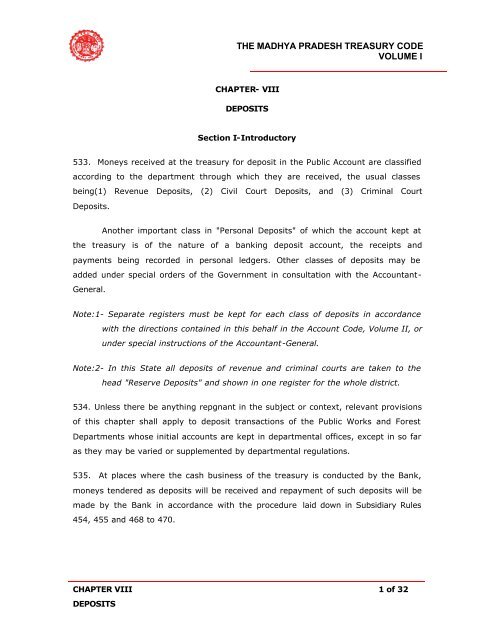
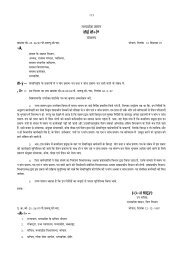
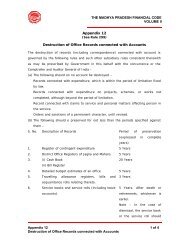
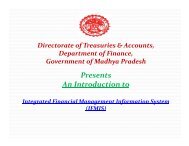
![Form M.P.F.C. 20 [See Rule 266 (4)] - Mptreasury.org](https://img.yumpu.com/50367893/1/190x146/form-mpfc-20-see-rule-266-4-mptreasuryorg.jpg?quality=85)
